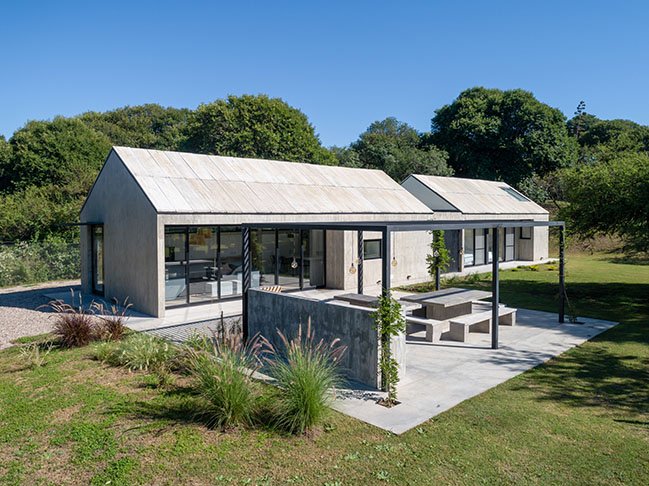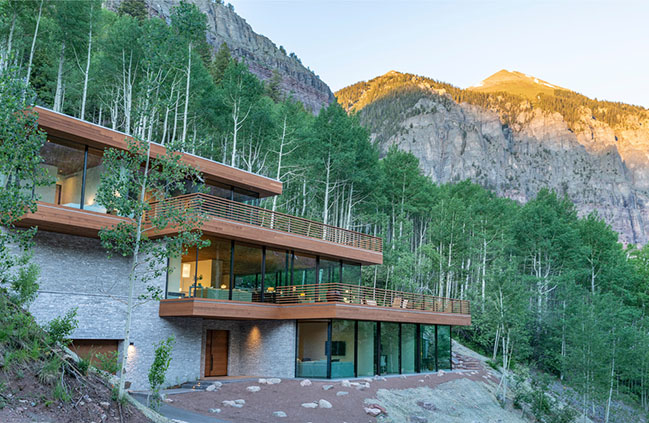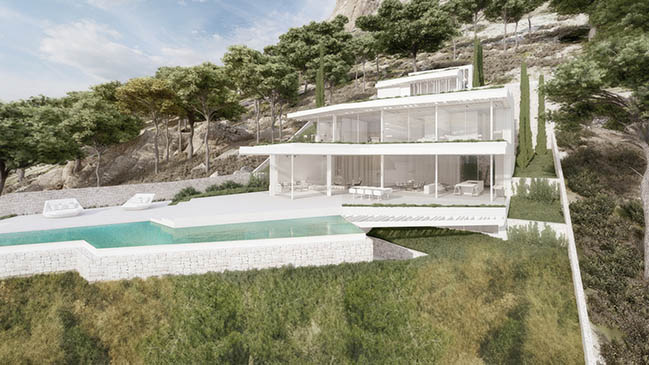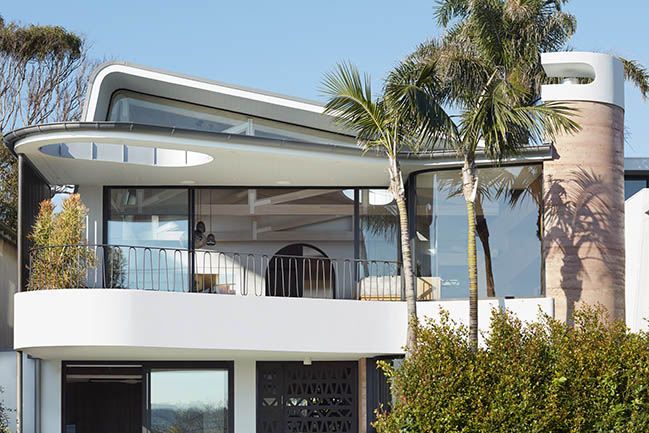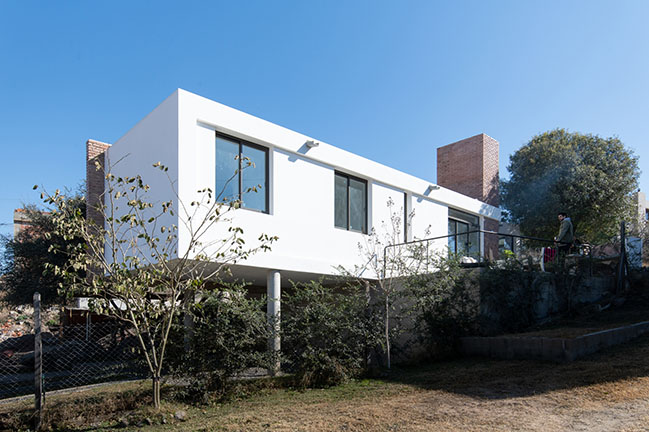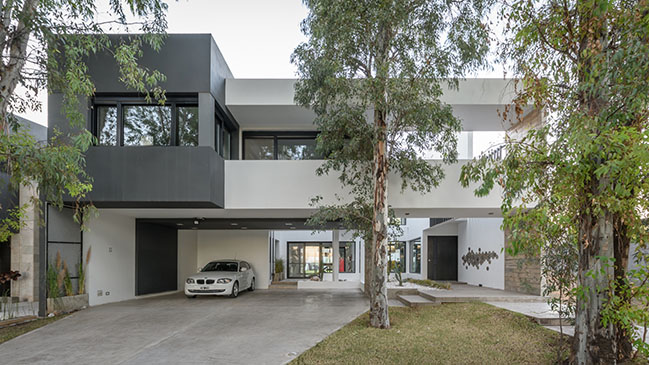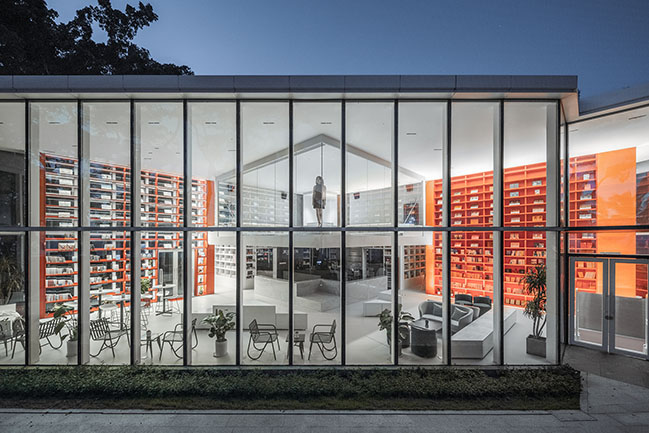07 / 15
2021
Formally, it is a classic, gable-roofed house in a quiet residential street north of Potsdamer Chaussee. But the original form of the residential house was reinterpreted by rundzwei Architekten BDA in the new construction of this wooden villa in Berlin-Nikolassee...
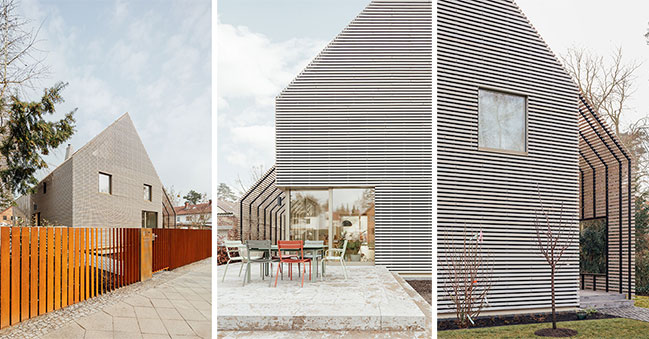
From the architect: The roof surfaces as well as the facades are covered on all four sides by a delicate, light-colored wooden lathing made of silver fir. With the exception of a few purposefully placed façade openings, the entire structure is surrounded by a homogeneous building envelope. Along the two eaves sides, the roof surfaces are extended beyond the structure as pergolas, thus extending the house into the garden.
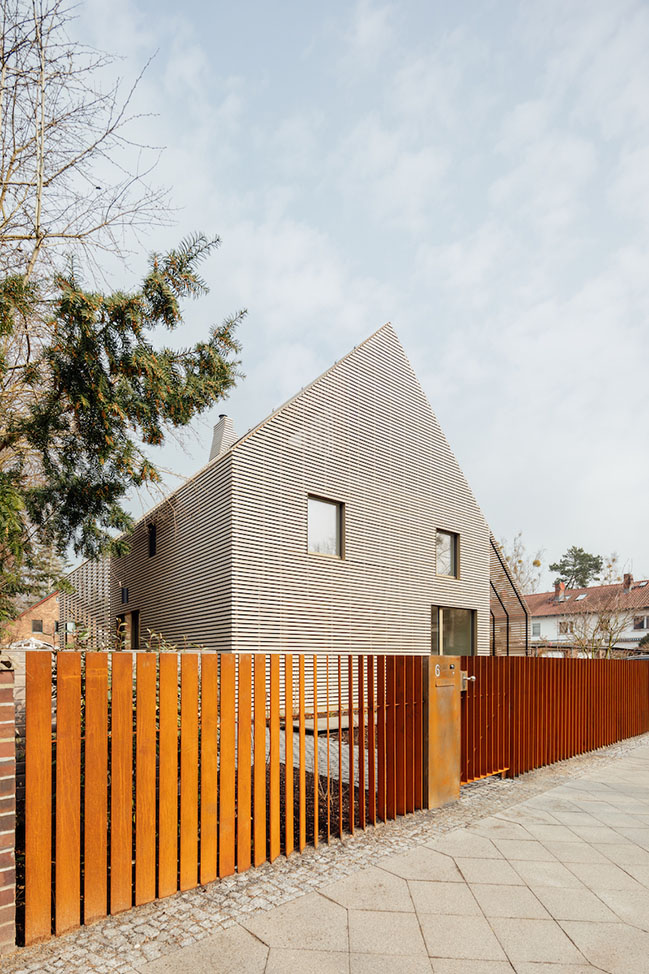
The uniform building envelope as protection and filter
The filigree shell shapes the building into an architectural unit, emphasizing the archetype of the classic single-family house on the one hand and blurring its form on the other. Functionally, the uniform roof and façade skin with its interstices serves as privacy and sun protection - it thus becomes a filter between "inside" and "outside" - and enables a specific external and internal perception of the building.
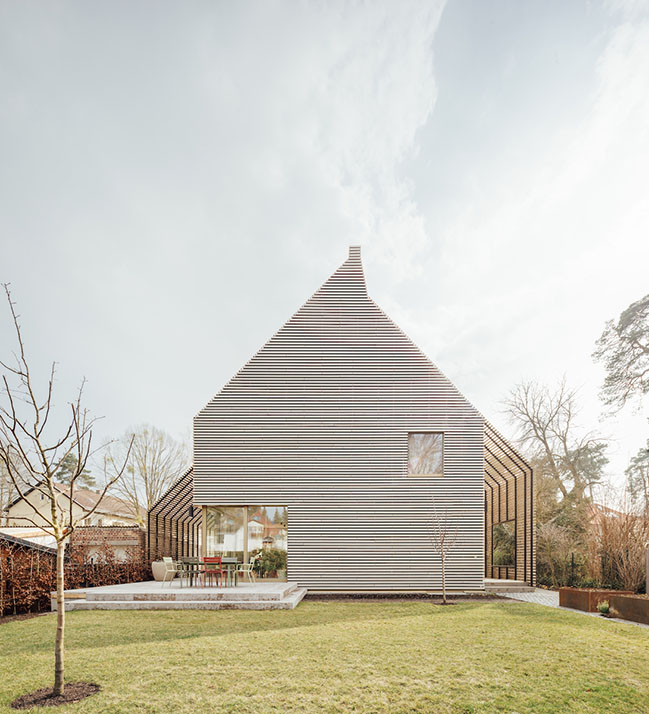
In contrast to the houses in the immediate neighborhood, the building with its almost square ground plan (approx. 10 m x 10 m) is relatively close to the street and separated from it only by an approx. six-meter-wide front garden. This position on the 520 m² plot increases the area for the garden behind the house, which is located on the north side.
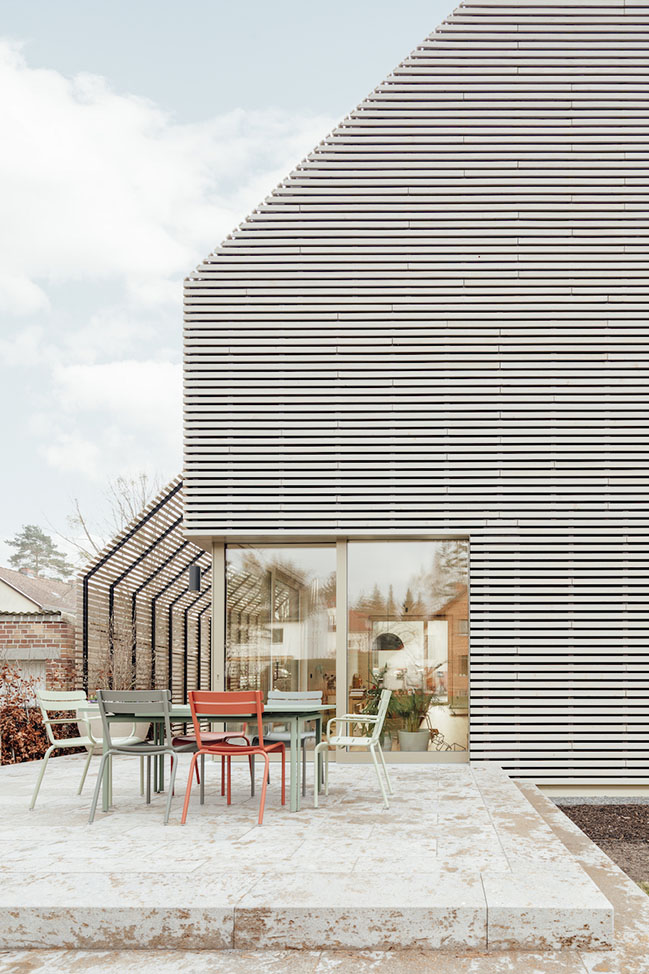
Extension of the building structure to the property line
The expansive roof surfaces extending from the building on the left above the terrace at the entrance to the house and on the right above the carport and bicycle parking spaces elegantly increase the area of the single-family house that can be used regardless of the weather. Thanks to them, the compact plot is optimally used: The distances required by building law are complied with, although, for example, the carport pergola above the bicycle parking spaces extends to the eastern boundary of the plot.
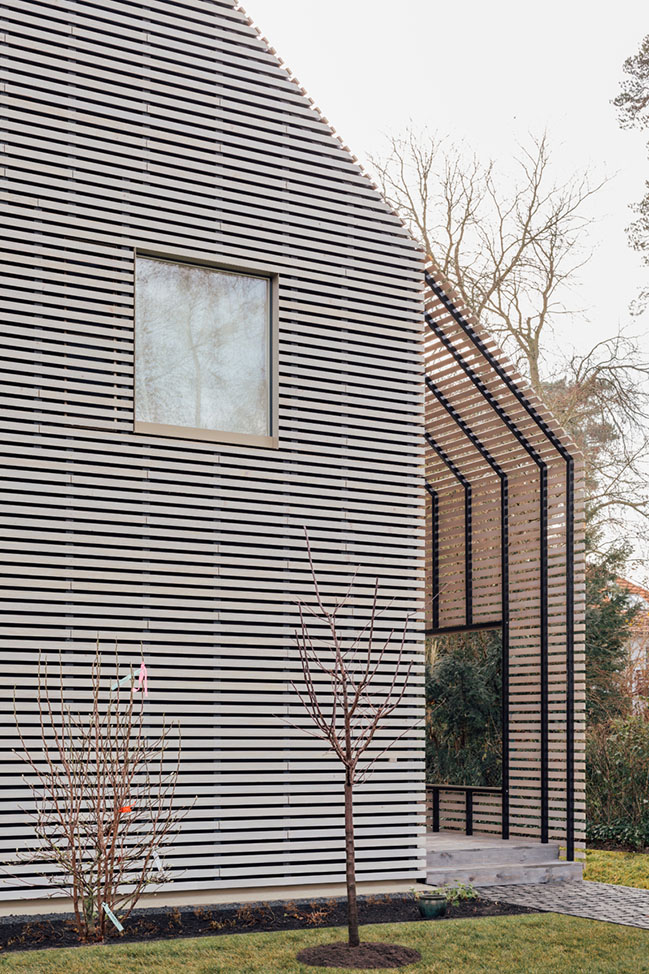
One enters the house via a narrow terrace along the west side of the house, protected from the weather thanks to the extended roof area above. The entrance area offers thoughtful features such as an elongated bench and discreetly hidden storage space for shoes and wardrobe in a small area - in addition to access to living spaces on the ground floor and first floor, as well as to the study.
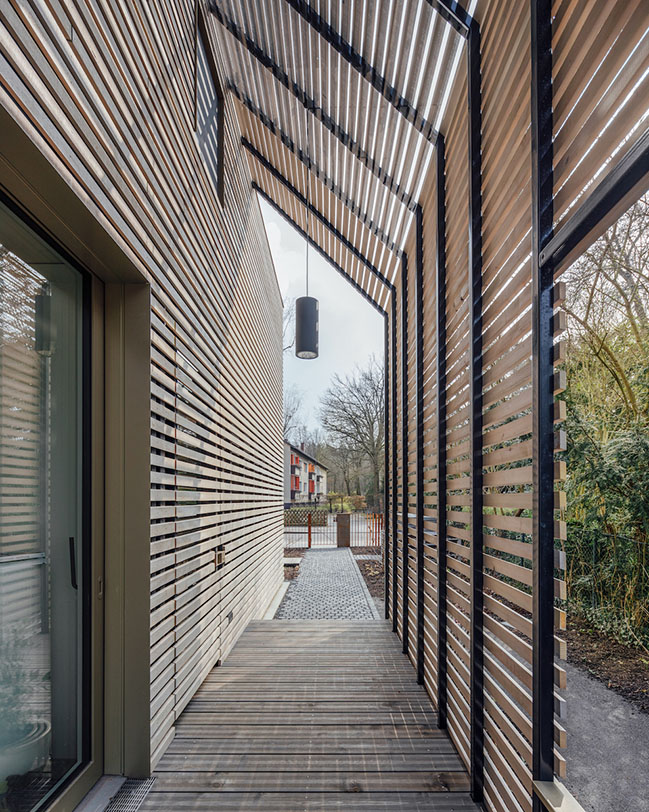
The basement with wellness area, building services and storage areas is also accessed via the entrance area. Two shafts on the street side as well as on the garden side of the house illuminate the elongated pool and the adjacent sunbathing and fitness areas. This creates a high-quality private space for sports and recreation.
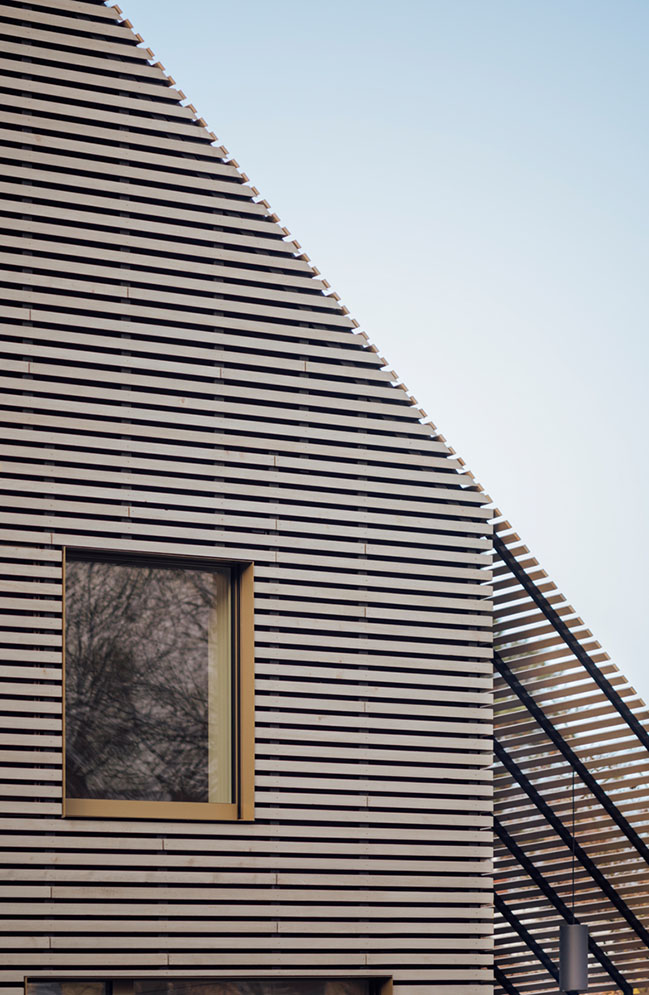
The horizontal and vertical "L" principle
On the first floor, the areas for living, dining and cooking are arranged in an L-shape around the compactly concentrated, "serving" functions (study, guest WC, stairs and storage areas). At its apex, this horizontal "L" connects the interior with the exterior through large glazed window areas. The patio doors, which open across the corner, extend the house into the garden.
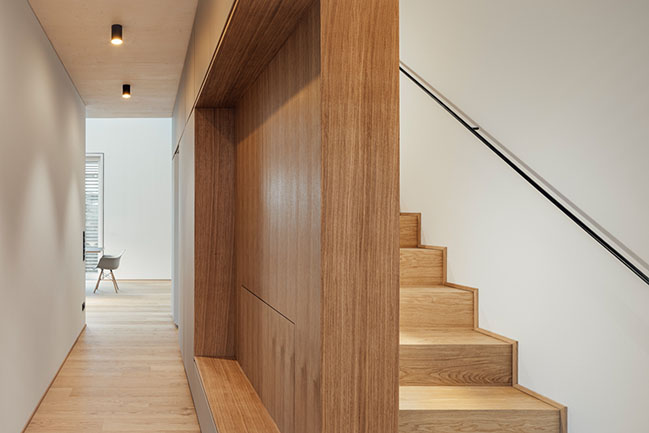
Above the dining area, an air space extends to below the pitched roof and forms a vertical "L" with the open kitchen or living room. This allows for visual relationships between the first floor and the floors above, which are realized as gallery levels - the filigree, suspended steel staircase between the upper floors also takes this design idea into account.
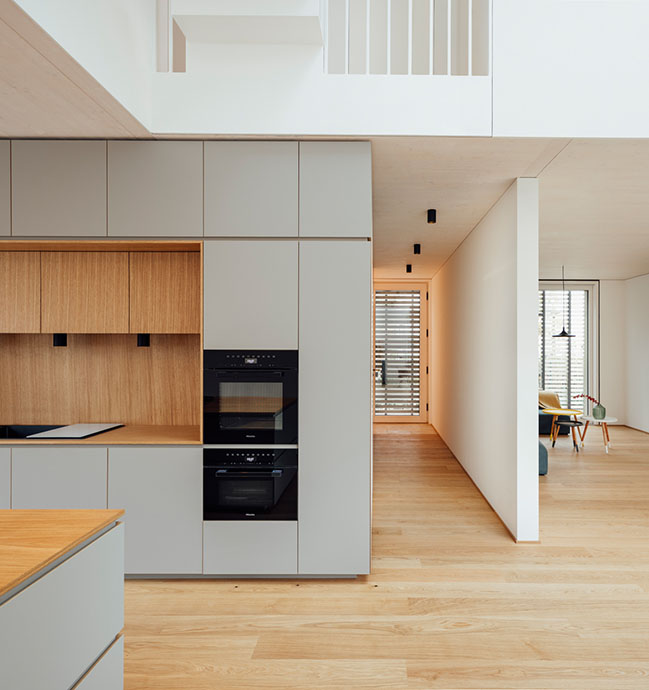
The functional zones "living", "dining" and "cooking" are clearly architecturally defined by the vertical and horizontal "L-principle": While the living area is pronounced rather intimate, slightly withdrawn, and the cooking area opens to the front garden and street, the "dining room" becomes the communicative heart of the villa.
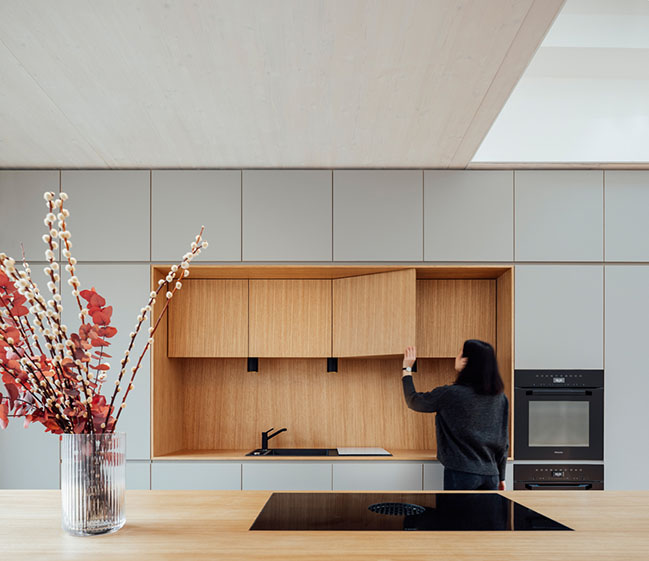
Bedroom with quality of stay
A single-flight straight staircase leads to the second floor. Here, again arranged in an "L" shape around the air space above the dining area, are the master bedroom and the children's bedrooms, with the shared bathroom in between. Accessible from both the master bedroom and the central hallway, it is equipped with two showers, two toilets and two sinks; a sliding door in the middle allows simultaneous, flexible use by different people. Individually designed shelves and built-in wardrobes provide order and clarity.
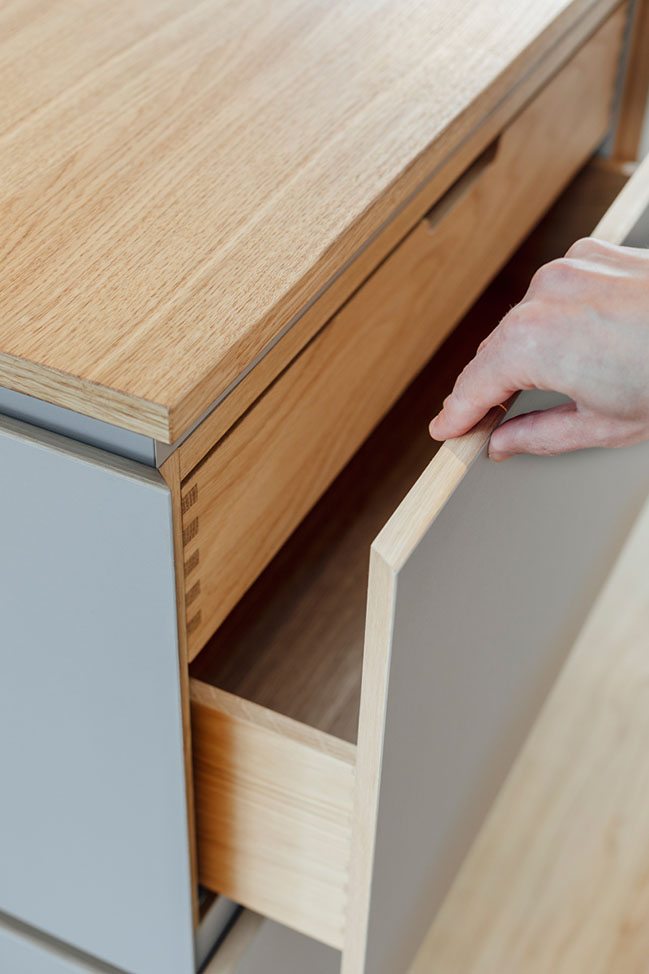
The two children's bedrooms face the street, while the master bedroom faces the garden. Each of these rooms has an elongated sitting window as a cozy place to stay. The windows are frameless and placed as close as possible to the outer skin and were therefore realized with fixed glazing. For manual ventilation, there is a vertical wooden opening next to each seat window. These ventilation sashes are concealed in the façade by the battens of the building shell and are thus virtually invisible from the outside.
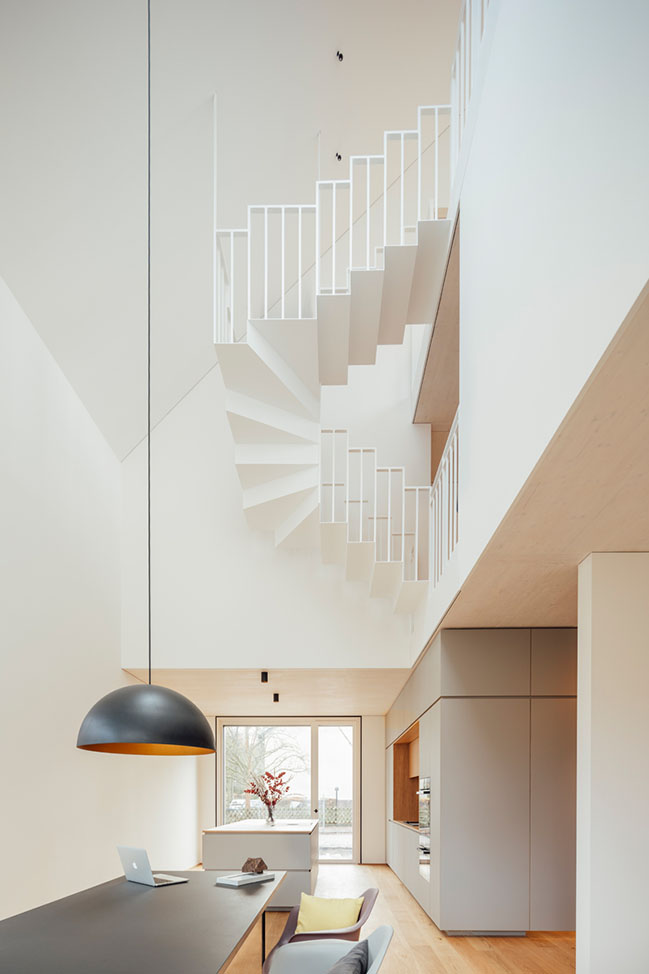
Retreat rooms under the roof
In the attic, an open gallery with a fireplace provides a semi-private retreat and lounge, which is intensively lit by the large skylight from the east and by the roof terrace on the west side of the house, which is accessible from here. A room separated from the gallery area can also be used as a guest room or another living space, thanks to its fully glazed western facade.
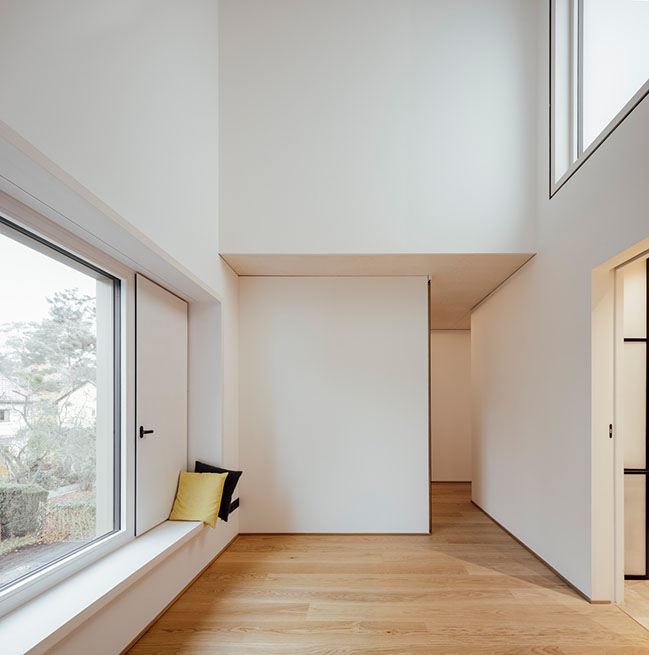
The spacious terrace is located behind or under the roof area, it is designed partly as an open cut into the building shell, partly covered like a pergola. This creates a flexible, sheltered retreat in the open air with a view of the lush vegetation to the west.
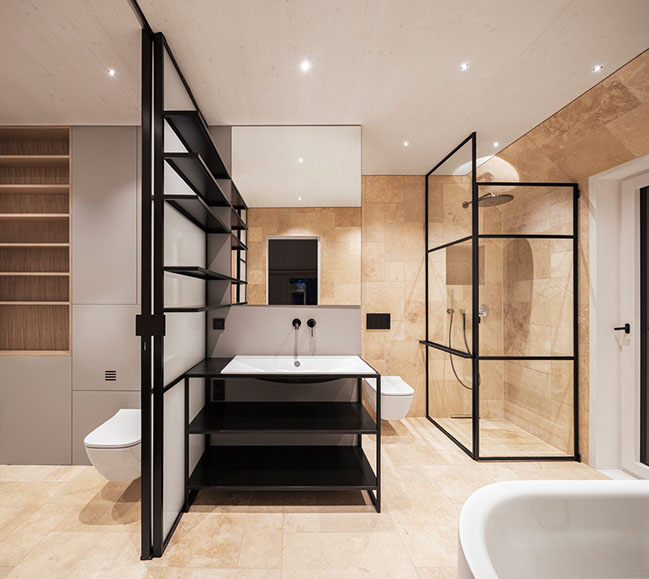
Natural air conditioning and intelligent sun protection
Except for basement exterior walls made of waterproof concrete, the building is designed as a pure timber construction. The interior walls (also in the basement) are load-bearing solid timber walls, the exterior walls were realized with prefabricated elements in timber panel construction. All ceilings including the basement ceiling are made of wood. In order to enable later recycling in the sense of the circular economy, connections between building components were made mechanically. Glued connections could thus be dispensed with as far as possible. The sheet metal roof under the roof cladding made of wooden slats is also designed for recycling.
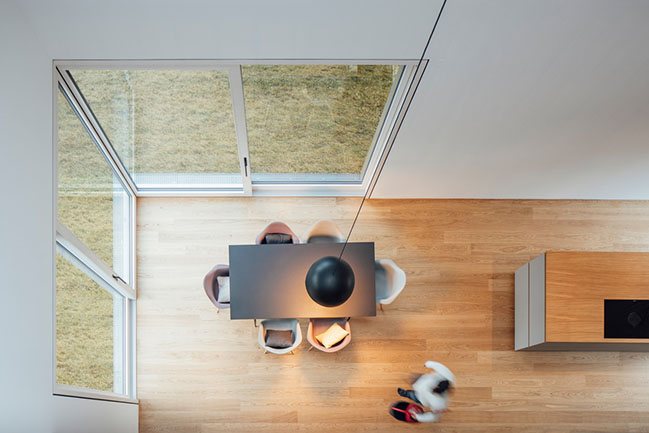
Wood wool is used as an insulating material for the KfW 55 house, while the interior walls are covered with gypsum fiberboard and a lime plaster. Gypsum fiber, thanks to its open pores, contributes to a natural climate control of the interiors. They are tempered by a low-temperature panel heating system, the heat for which is generated by a gas-fired cogeneration plant in the basement, which also generates electricity for the residents:inside.
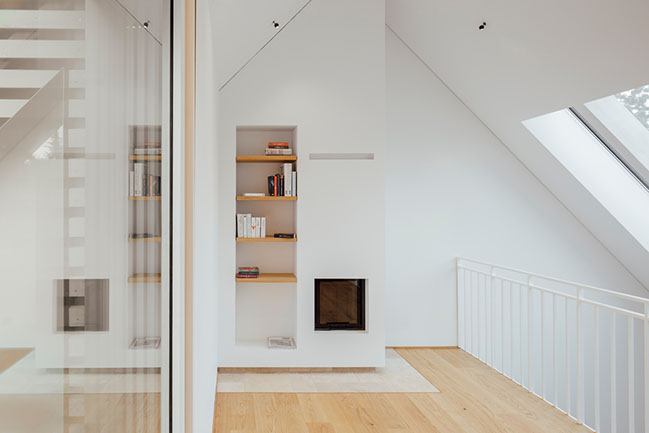
The building materials wood, gypsum and lime absorb moisture and also release it back into the room air. Especially in winter, the quality of living is thus significantly increased by the higher humidity. During the summer months, the building envelope, which is slightly offset from the actual structure, protects against heating by the sun. Controlled by sensors, the skylights and the terrace on the top floor are automatically shaded when the sun shines. In addition, the roof surfaces, which are extended as pergolas, serve as sun protection from the lateral house facades. In this way, the relatively simple building technology ensures that the interior of the house is warmer than 26° C on a maximum of twelve days per year.
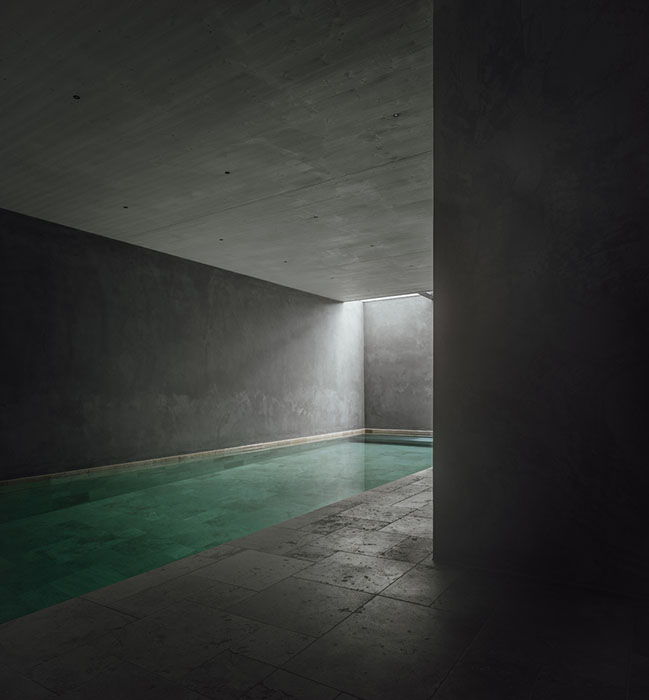
Consistent choice of materials and fine details
The clear architectural language of the timber construction villa corresponds with the consistent choice of materials and well thought-out detailing. While the wellness areas in the basement create a contemplative spatial impression with beige-brown natural stone floors and gray mineral plaster walls, the first floor and upper floors shine in the bright white of the walls, ceilings and steel stairs.
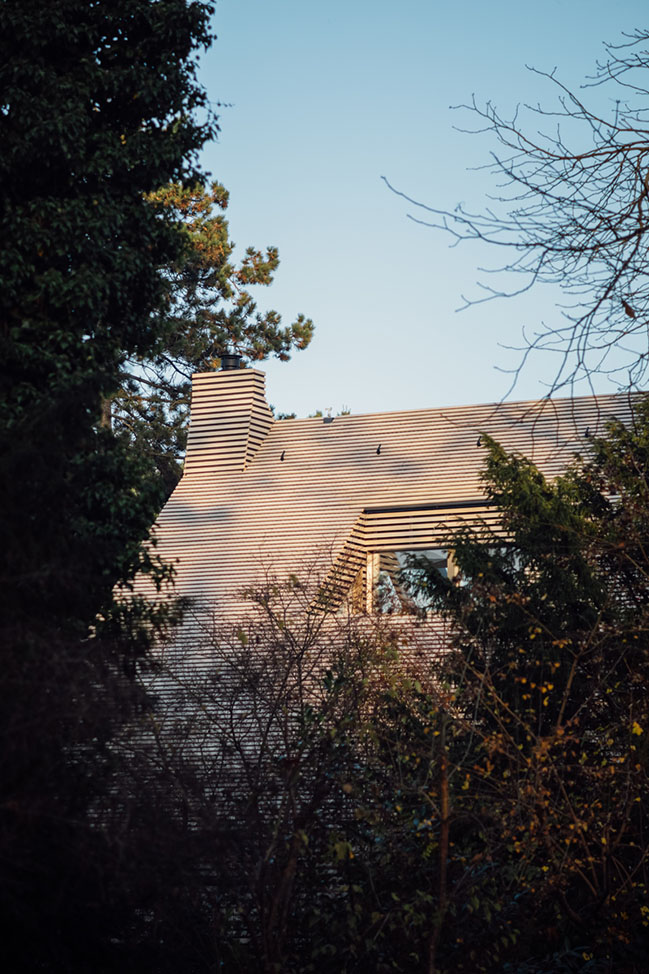
Floor and stair coverings, as well as the seating windows or the fixtures in the hallway and kitchen, on the other hand, are made of oak wood left in its natural state. Vertical surfaces of cabinets and drawers are uniformly finished in gray linoleum. For the sanitary areas as well as the swimming pool, roundtwo architects have developed a consistent material composition: Beige-brown mottled travertine on walls and floors contrasts with black steel elements, light switches and fittings.
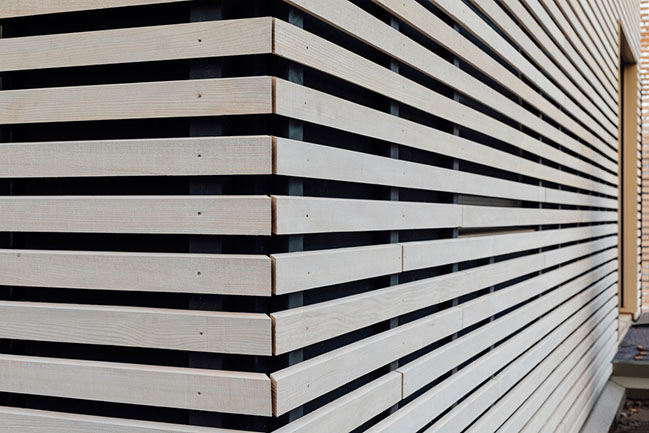
Architect: rundzwei Architekten BDA
Location: Berlin-Nikolassee
Year: 2020
GFA: 400 m2
Usable area. 350 m2
Gross volume: 1.150 m3
Project Team: Michelle Bähr, Constantin Blömer, Luca Di Carlo, Marc Dufour-Feronce, Raimon Espasa Bou, Lou Pelosoff, Andreas Reeg
Structural Engineering: ZRS Ingenieure
Energy Planning: ZRS Ingenieure
Photography: Gui Rebelo architeture photography
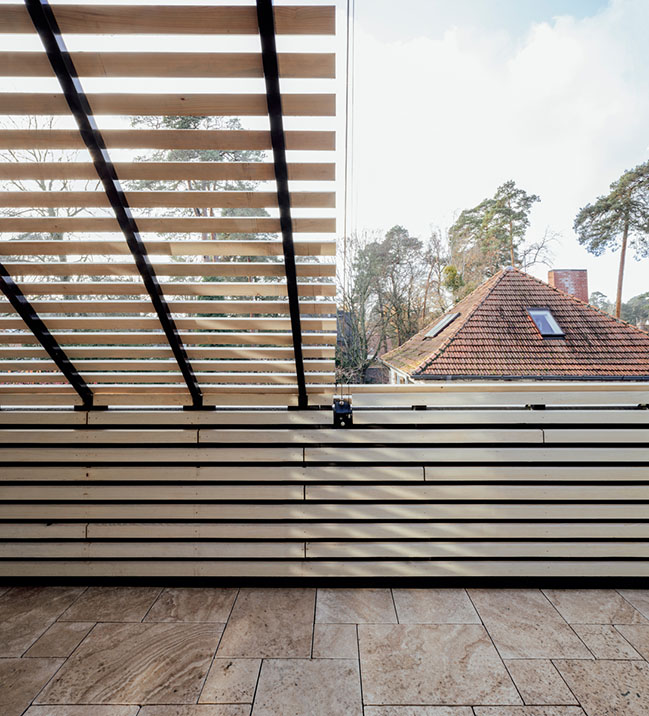
YOU MAY ALSO LIKE:
> Cork Screw House by rundzwei Architekten BDA
> Wooden holiday retreat Villa Tonden by HofmanDujardin

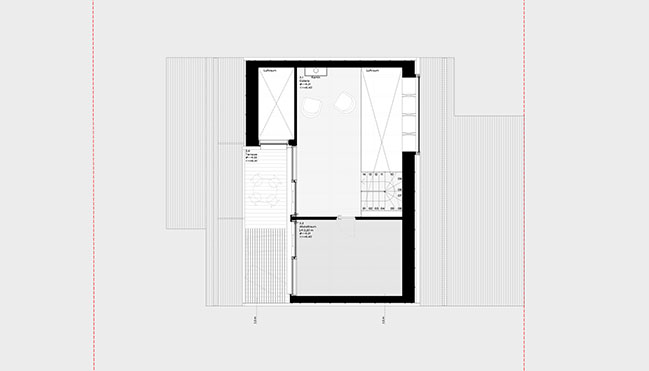
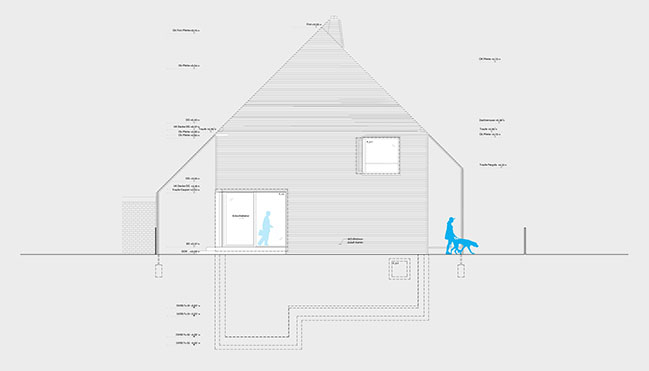
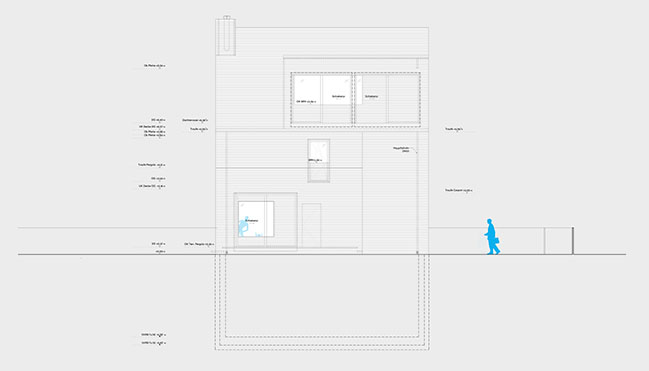
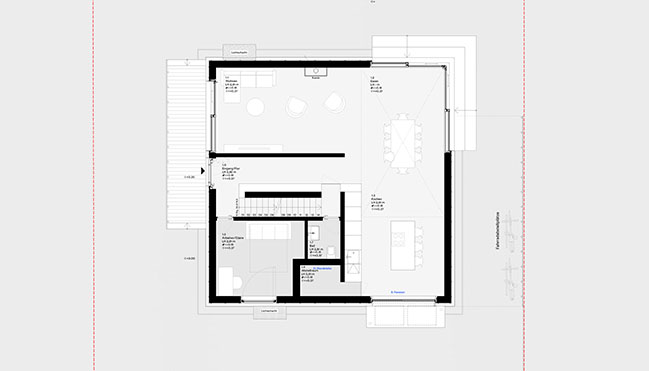
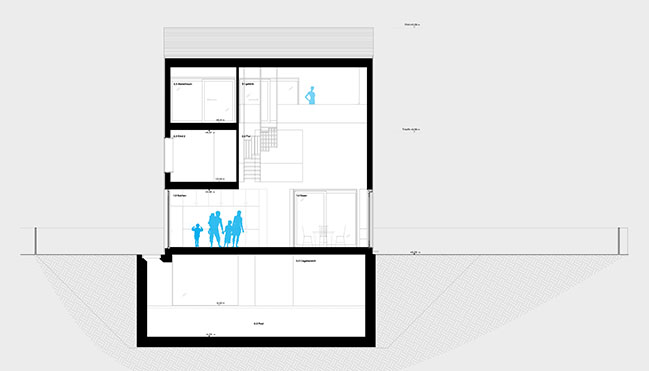
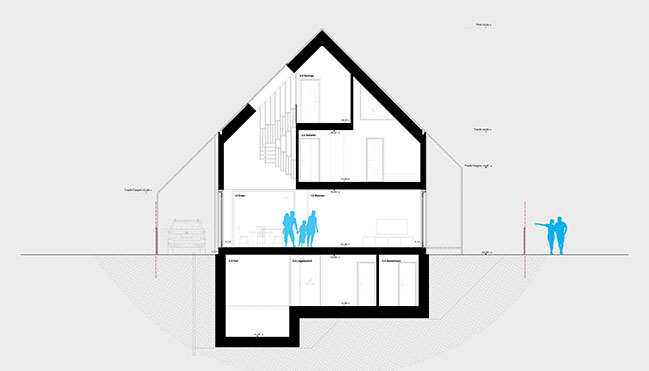
Pergola House: A wooden villa by rundzwei Architekten BDA in Berlin
07 / 15 / 2021 Formally, it is a classic, gable-roofed house in a quiet residential street north of Potsdamer Chaussee. But the original form of the residential house was reinterpreted by rundzwei Architekten BDA in the new construction of this wooden villa in Berlin-Nikolassee...
You might also like:
Recommended post: Tianya Books by Wutopia Lab - Bookstore at the End of the Earth
